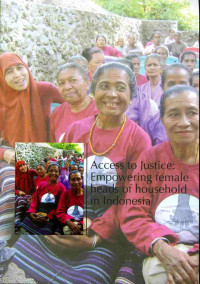
Text
Access to justice : Empowering female heads of household in Indonesia
In line with the process of democratization, the Government is fully aware that implementation of the National Strategy requires active participation from various parties and stakeholders. Justice issues, especially for poor and marginalized community members and women, have complex dimensions and require a multidimensional approach. For these reasons, the Government welcomes and supports every effort made by many parties, including civil society, to improve access to justice for the poor. This access to justice research Empowering Female Heads of Household in Indonesia was implemented jointly by the National Secretariat for the Empowerment of Female Heads of Household (Seknas PEKKA), the Supreme Court, SMERU, the Indonesia Australia Legal Development Facility (IALDF) and the Family Court of Australia, and it represents a concrete outcome of the National Access to Justice Strategy. It is hoped that the results of this research will assist many parties, including Government and civil society in partnership, to develop programmes to empower poor communities, especially female heads of household, so as to contribute to the building of a prosperous and just society and, furthermore, to assist in eradicating poverty. These are objectives that have for some time been the subject of Government programmes, including the National Community Empowerment Programme (PNPM). Connected to these issues, Presidential Regulation Number 5 of 2010 concerning the National Medium Term Development Plan (RPJMN) 2010-2014 has budgeted approximately Rp 300 billion to support access to the Indonesian courts for the poor, including court fee waivers, circuit courts and legal aid, all disbursed by the Supreme Court.
Availability
| KP.II-00081 | KP.II PEK A | My Library | Available |
Detail Information
- Series Title
-
-
- Call Number
-
KP.II.IND a
- Publisher
- Jakarta Indonesia : indonesia Australia Legal Development Facility ( IALDF)., 2010
- Collation
-
ix, 78 hlm.; ill. ; 30cm
- Language
-
English
- ISBN/ISSN
-
-
- Classification
-
KP.II
- Content Type
-
-
- Media Type
-
-
- Carrier Type
-
-
- Edition
-
-
- Subject(s)
- Specific Detail Info
-
-
- Statement of Responsibility
-
-
Other version/related
No other version available
File Attachment
Comments
You must be logged in to post a comment
 Computer Science, Information & General Works
Computer Science, Information & General Works  Philosophy & Psychology
Philosophy & Psychology  Religion
Religion  Social Sciences
Social Sciences  Language
Language  Pure Science
Pure Science  Applied Sciences
Applied Sciences  Art & Recreation
Art & Recreation  Literature
Literature  History & Geography
History & Geography